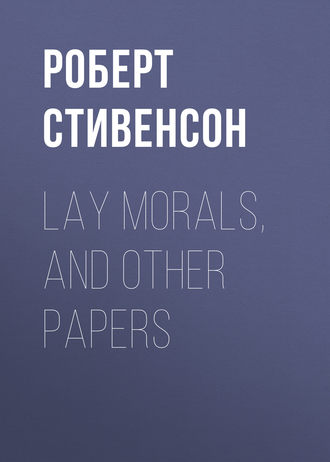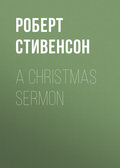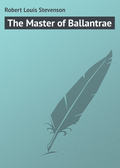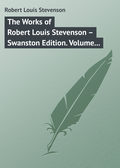
Роберт Льюис Стивенсон
Lay Morals, and Other Papers
COLLEGE PAPERS
CHAPTER I – EDINBURGH STUDENTS IN 1824
On the 2nd of January 1824 was issued the prospectus of the Lapsus Linguæ; or, the College Tatler; and on the 7th the first number appeared. On Friday the 2nd of April ‘Mr. Tatler became speechless.’ Its history was not all one success; for the editor (who applies to himself the words of Iago, ‘I am nothing if I am not critical’) overstepped the bounds of caution, and found himself seriously embroiled with the powers that were. There appeared in No. xvi. a most bitter satire upon Sir John Leslie, in which he was compared to Falstaff, charged with puffing himself, and very prettily censured for publishing only the first volume of a class-book, and making all purchasers pay for both. Sir John Leslie took up the matter angrily, visited Carfrae the publisher, and threatened him with an action, till he was forced to turn the hapless Lapsus out of doors. The maltreated periodical found shelter in the shop of Huie, Infirmary Street; and No. xvii. was duly issued from the new office. No. xvii. beheld Mr. Tatler’s humiliation, in which, with fulsome apology and not very credible assurances of respect and admiration, he disclaims the article in question, and advertises a new issue of No. xvi. with all objectionable matter omitted. This, with pleasing euphemism, he terms in a later advertisement, ‘a new and improved edition.’ This was the only remarkable adventure of Mr. Tatler’s brief existence; unless we consider as such a silly Chaldee manuscript in imitation of Blackwood, and a letter of reproof from a divinity student on the impiety of the same dull effusion. He laments the near approach of his end in pathetic terms. ‘How shall we summon up sufficient courage,’ says he, ‘to look for the last time on our beloved little devil and his inestimable proof-sheet? How shall we be able to pass No. 14 Infirmary Street and feel that all its attractions are over? How shall we bid farewell for ever to that excellent man, with the long greatcoat, wooden leg and wooden board, who acts as our representative at the gate of Alma Mater?’ But alas! he had no choice: Mr. Tatler, whose career, he says himself, had been successful, passed peacefully away, and has ever since dumbly implored ‘the bringing home of bell and burial.’
Alter et idem. A very different affair was the Lapsus Linguæ from the Edinburgh University Magazine. The two prospectuses alone, laid side by side, would indicate the march of luxury and the repeal of the paper duty. The penny bi-weekly broadside of session 1828–4 was almost wholly dedicated to Momus. Epigrams, pointless letters, amorous verses, and University grievances are the continual burthen of the song. But Mr. Tatler was not without a vein of hearty humour; and his pages afford what is much better: to wit, a good picture of student life as it then was. The students of those polite days insisted on retaining their hats in the class-room. There was a cab-stance in front of the College; and ‘Carriage Entrance’ was posted above the main arch, on what the writer pleases to call ‘coarse, unclassic boards.’ The benches of the ‘Speculative’ then, as now, were red; but all other Societies (the ‘Dialectic’ is the only survivor) met downstairs, in some rooms of which it is pointedly said that ‘nothing else could conveniently be made of them.’ However horrible these dungeons may have been, it is certain that they were paid for, and that far too heavily for the taste of session 1823–4, which found enough calls upon its purse for porter and toasted cheese at Ambrose’s, or cranberry tarts and ginger-wine at Doull’s. Duelling was still a possibility; so much so that when two medicals fell to fisticuffs in Adam Square, it was seriously hinted that single combat would be the result. Last and most wonderful of all, Gall and Spurzheim were in every one’s mouth; and the Law student, after having exhausted Byron’s poetry and Scott’s novels, informed the ladies of his belief in phrenology. In the present day he would dilate on ‘Red as a rose is she,’ and then mention that he attends Old Greyfriars’, as a tacit claim to intellectual superiority. I do not know that the advance is much.
But Mr. Tatler’s best performances were three short papers in which he hit off pretty smartly the idiosyncrasies of the ‘Divinity,’ the ‘Medical,’ and the ‘Law’ of session 1823–4. The fact that there was no notice of the ‘Arts’ seems to suggest that they stood in the same intermediate position as they do now – the epitome of student-kind. Mr. Tatler’s satire is, on the whole, good-humoured, and has not grown superannuated in all its limbs. His descriptions may limp at some points, but there are certain broad traits that apply equally well to session 1870–1. He shows us the Divinity of the period – tall, pale, and slender – his collar greasy, and his coat bare about the seams – ‘his white neckcloth serving four days, and regularly turned the third’ – ‘the rim of his hat deficient in wool’ – and ‘a weighty volume of theology under his arm.’ He was the man to buy cheap ‘a snuff-box, or a dozen of pencils, or a six-bladed knife, or a quarter of a hundred quills,’ at any of the public sale-rooms. He was noted for cheap purchases, and for exceeding the legal tender in halfpence. He haunted ‘the darkest and remotest corner of the Theatre Gallery.’ He was to be seen issuing from ‘aerial lodging-houses.’ Withal, says mine author, ‘there were many good points about him: he paid his landlady’s bill, read his Bible, went twice to church on Sunday, seldom swore, was not often tipsy, and bought the Lapsus Linguæ.’
The Medical, again, ‘wore a white greatcoat, and consequently talked loud’ – (there is something very delicious in that consequently). He wore his hat on one side. He was active, volatile, and went to the top of Arthur’s Seat on the Sunday forenoon. He was as quiet in a debating society as he was loud in the streets. He was reckless and imprudent: yesterday he insisted on your sharing a bottle of claret with him (and claret was claret then, before the cheap-and-nasty treaty), and to-morrow he asks you for the loan of a penny to buy the last number of the Lapsus.
The student of Law, again, was a learned man. ‘He had turned over the leaves of Justinian’s Institutes, and knew that they were written in Latin. He was well acquainted with the title-page of Blackstone’s Commentaries, and argal (as the gravedigger in Hamlet says) he was not a person to be laughed at.’ He attended the Parliament House in the character of a critic, and could give you stale sneers at all the celebrated speakers. He was the terror of essayists at the Speculative or the Forensic. In social qualities he seems to have stood unrivalled. Even in the police-office we find him shining with undiminished lustre. ‘If a Charlie should find him rather noisy at an untimely hour, and venture to take him into custody, he appears next morning like a Daniel come to judgment. He opens his mouth to speak, and the divine precepts of unchanging justice and Scots law flow from his tongue. The magistrate listens in amazement, and fines him only a couple of guineas.’
Such then were our predecessors and their College Magazine. Barclay, Ambrose, Young Amos, and Fergusson were to them what the Café, the Rainbow, and Rutherford’s are to us. An hour’s reading in these old pages absolutely confuses us, there is so much that is similar and so much that is different; the follies and amusements are so like our own, and the manner of frolicking and enjoying are so changed, that one pauses and looks about him in philosophic judgment. The muddy quadrangle is thick with living students; but in our eyes it swarms also with the phantasmal white greatcoats and tilted hats of 1824. Two races meet: races alike and diverse. Two performances are played before our eyes; but the change seems merely of impersonators, of scenery, of costume. Plot and passion are the same. It is the fall of the spun shilling whether seventy-one or twenty-four has the best of it.
In a future number we hope to give a glance at the individualities of the present, and see whether the cast shall be head or tail – whether we or the readers of the Lapsus stand higher in the balance.
CHAPTER II – THE MODERN STUDENT CONSIDERED GENERALLY
We have now reached the difficult portion of our task. Mr. Tatler, for all that we care, may have been as virulent as he liked about the students of a former; but for the iron to touch our sacred selves, for a brother of the Guild to betray its most privy infirmities, let such a Judas look to himself as he passes on his way to the Scots Law or the Diagnostic, below the solitary lamp at the corner of the dark quadrangle. We confess that this idea alarms us. We enter a protest. We bind ourselves over verbally to keep the peace. We hope, moreover, that having thus made you secret to our misgivings, you will excuse us if we be dull, and set that down to caution which you might before have charged to the account of stupidity.
The natural tendency of civilisation is to obliterate those distinctions which are the best salt of life. All the fine old professional flavour in language has evaporated. Your very gravedigger has forgotten his avocation in his electorship, and would quibble on the Franchise over Ophelia’s grave, instead of more appropriately discussing the duration of bodies under ground. From this tendency, from this gradual attrition of life, in which everything pointed and characteristic is being rubbed down, till the whole world begins to slip between our fingers in smooth undistinguishable sands, from this, we say, it follows that we must not attempt to join Mr. Taller in his simple division of students into Law, Divinity, and Medical. Nowadays the Faculties may shake hands over their follies; and, like Mrs. Frail and Mrs. Foresight (in Love for Love) they may stand in the doors of opposite class-rooms, crying: ‘Sister, Sister – Sister everyway!’ A few restrictions, indeed, remain to influence the followers of individual branches of study. The Divinity, for example, must be an avowed believer; and as this, in the present day, is unhappily considered by many as a confession of weakness, he is fain to choose one of two ways of gilding the distasteful orthodox bolus. Some swallow it in a thin jelly of metaphysics; for it is even a credit to believe in God on the evidence of some crack-jaw philosopher, although it is a decided slur to believe in Him on His own authority. Others again (and this we think the worst method), finding German grammar a somewhat dry morsel, run their own little heresy as a proof of independence; and deny one of the cardinal doctrines that they may hold the others without being laughed at.
Besides, however, such influences as these, there is little more distinction between the faculties than the traditionary ideal, handed down through a long sequence of students, and getting rounder and more featureless at each successive session. The plague of uniformity has descended on the College. Students (and indeed all sorts and conditions of men) now require their faculty and character hung round their neck on a placard, like the scenes in Shakespeare’s theatre. And in the midst of all this weary sameness, not the least common feature is the gravity of every face. No more does the merry medical run eagerly in the clear winter morning up the rugged sides of Arthur’s Seat, and hear the church bells begin and thicken and die away below him among the gathered smoke of the city. He will not break Sunday to so little purpose. He no longer finds pleasure in the mere output of his surplus energy. He husbands his strength, and lays out walks, and reading, and amusement with deep consideration, so that he may get as much work and pleasure out of his body as he can, and waste none of his energy on mere impulse, or such flat enjoyment as an excursion in the country.
See the quadrangle in the interregnum of classes, in those two or three minutes when it is full of passing students, and we think you will admit that, if we have not made it ‘an habitation of dragons,’ we have at least transformed it into ‘a court for owls.’ Solemnity broods heavily over the enclosure; and wherever you seek it, you will find a dearth of merriment, an absence of real youthful enjoyment. You might as well try
‘To move wild laughter in the throat of death’
as to excite any healthy stir among the bulk of this staid company.
The studious congregate about the doors of the different classes, debating the matter of the lecture, or comparing note-books. A reserved rivalry sunders them. Here are some deep in Greek particles: there, others are already inhabitants of that land
‘Where entity and quiddity,
‘Like ghosts of defunct bodies fly —
Where Truth in person does appear
Like words congealed in northern air.’
But none of them seem to find any relish for their studies – no pedantic love of this subject or that lights up their eyes – science and learning are only means for a livelihood, which they have considerately embraced and which they solemnly pursue. ‘Labour’s pale priests,’ their lips seem incapable of laughter, except in the way of polite recognition of professorial wit. The stains of ink are chronic on their meagre fingers. They walk like Saul among the asses.
The dandies are not less subdued. In 1824 there was a noisy dapper dandyism abroad. Vulgar, as we should now think, but yet genial – a matter of white greatcoats and loud voices – strangely different from the stately frippery that is rife at present. These men are out of their element in the quadrangle. Even the small remains of boisterous humour, which still clings to any collection of young men, jars painfully on their morbid sensibilities; and they beat a hasty retreat to resume their perfunctory march along Princes Street. Flirtation is to them a great social duty, a painful obligation, which they perform on every occasion in the same chill official manner, and with the same commonplace advances, the same dogged observance of traditional behaviour. The shape of their raiment is a burden almost greater than they can bear, and they halt in their walk to preserve the due adjustment of their trouser-knees, till one would fancy he had mixed in a procession of Jacobs. We speak, of course, for ourselves; but we would as soon associate with a herd of sprightly apes as with these gloomy modern beaux. Alas, that our Mirabels, our Valentines, even our Brummels, should have left their mantles upon nothing more amusing!
Nor are the fast men less constrained. Solemnity, even in dissipation, is the order of the day; and they go to the devil with a perverse seriousness, a systematic rationalism of wickedness that would have surprised the simpler sinners of old. Some of these men whom we see gravely conversing on the steps have but a slender acquaintance with each other. Their intercourse consists principally of mutual bulletins of depravity; and, week after week, as they meet they reckon up their items of transgression, and give an abstract of their downward progress for approval and encouragement. These folk form a freemasonry of their own. An oath is the shibboleth of their sinister fellowship. Once they hear a man swear, it is wonderful how their tongues loosen and their bashful spirits take enlargement, under the consciousness of brotherhood. There is no folly, no pardoning warmth of temper about them; they are as steady-going and systematic in their own way as the studious in theirs.
Not that we are without merry men. No. We shall not be ungrateful to those, whose grimaces, whose ironical laughter, whose active feet in the ‘College Anthem’ have beguiled so many weary hours and added a pleasant variety to the strain of close attention. But even these are too evidently professional in their antics. They go about cogitating puns and inventing tricks. It is their vocation, Hal. They are the gratuitous jesters of the class-room; and, like the clown when he leaves the stage, their merriment too often sinks as the bell rings the hour of liberty, and they pass forth by the Post-Office, grave and sedate, and meditating fresh gambols for the morrow.
This is the impression left on the mind of any observing student by too many of his fellows. They seem all frigid old men; and one pauses to think how such an unnatural state of matters is produced. We feel inclined to blame for it the unfortunate absence of University feeling which is so marked a characteristic of our Edinburgh students. Academical interests are so few and far between – students, as students, have so little in common, except a peevish rivalry – there is such an entire want of broad college sympathies and ordinary college friendships, that we fancy that no University in the kingdom is in so poor a plight. Our system is full of anomalies. A, who cut B whilst he was a shabby student, curries sedulously up to him and cudgels his memory for anecdotes about him when he becomes the great so-and-so. Let there be an end of this shy, proud reserve on the one hand, and this shuddering fine ladyism on the other; and we think we shall find both ourselves and the College bettered. Let it be a sufficient reason for intercourse that two men sit together on the same benches. Let the great A be held excused for nodding to the shabby B in Princes Street, if he can say, ‘That fellow is a student.’ Once this could be brought about, we think you would find the whole heart of the University beat faster. We think you would find a fusion among the students, a growth of common feelings, an increasing sympathy between class and class, whose influence (in such a heterogeneous company as ours) might be of incalculable value in all branches of politics and social progress. It would do more than this. If we could find some method of making the University a real mother to her sons – something beyond a building of class-rooms, a Senatus and a lottery of somewhat shabby prizes – we should strike a death-blow at the constrained and unnatural attitude of our Society. At present we are not a united body, but a loose gathering of individuals, whose inherent attraction is allowed to condense them into little knots and coteries. Our last snowball riot read us a plain lesson on our condition. There was no party spirit – no unity of interests. A few, who were mischievously inclined, marched off to the College of Surgeons in a pretentious file; but even before they reached their destination the feeble inspiration had died out in many, and their numbers were sadly thinned. Some followed strange gods in the direction of Drummond Street, and others slunk back to meek good-boyism at the feet of the Professors. The same is visible in better things. As you send a man to an English University that he may have his prejudices rubbed off, you might send him to Edinburgh that he may have them ingrained – rendered indelible – fostered by sympathy into living principles of his spirit. And the reason of it is quite plain. From this absence of University feeling it comes that a man’s friendships are always the direct and immediate results of these very prejudices. A common weakness is the best master of ceremonies in our quadrangle: a mutual vice is the readiest introduction. The studious associate with the studious alone – the dandies with the dandies. There is nothing to force them to rub shoulders with the others; and so they grow day by day more wedded to their own original opinions and affections. They see through the same spectacles continually. All broad sentiments, all real catholic humanity expires; and the mind gets gradually stiffened into one position – becomes so habituated to a contracted atmosphere, that it shudders and withers under the least draught of the free air that circulates in the general field of mankind.
Specialism in Society then is, we think, one cause of our present state. Specialism in study is another. We doubt whether this has ever been a good thing since the world began; but we are sure it is much worse now than it was. Formerly, when a man became a specialist, it was out of affection for his subject. With a somewhat grand devotion he left all the world of Science to follow his true love; and he contrived to find that strange pedantic interest which inspired the man who
‘Settled Hoti’s business – let it be —
Properly based Oun —
Gave us the doctrine of the enclitic De,
Dead from the waist down.’
Nowadays it is quite different. Our pedantry wants even the saving clause of Enthusiasm. The election is now matter of necessity and not of choice. Knowledge is now too broad a field for your Jack-of-all-Trades; and, from beautifully utilitarian reasons, he makes his choice, draws his pen through a dozen branches of study, and behold – John the Specialist. That this is the way to be wealthy we shall not deny; but we hold that it is not the way to be healthy or wise. The whole mind becomes narrowed and circumscribed to one ‘punctual spot’ of knowledge. A rank unhealthy soil breeds a harvest of prejudices. Feeling himself above others in his one little branch – in the classification of toadstools, or Carthaginian history – he waxes great in his own eyes and looks down on others. Having all his sympathies educated in one way, they die out in every other; and he is apt to remain a peevish, narrow, and intolerant bigot. Dilettante is now a term of reproach; but there is a certain form of dilettantism to which no one can object. It is this that we want among our students. We wish them to abandon no subject until they have seen and felt its merit – to act under a general interest in all branches of knowledge, not a commercial eagerness to excel in one.
In both these directions our sympathies are constipated. We are apostles of our own caste and our own subject of study, instead of being, as we should, true men and loving students. Of course both of these could be corrected by the students themselves; but this is nothing to the purpose: it is more important to ask whether the Senatus or the body of alumni could do nothing towards the growth of better feeling and wider sentiments. Perhaps in another paper we may say something upon this head.
One other word, however, before we have done. What shall we be when we grow really old? Of yore, a man was thought to lay on restrictions and acquire new deadweight of mournful experience with every year, till he looked back on his youth as the very summer of impulse and freedom. We please ourselves with thinking that it cannot be so with us. We would fain hope that, as we have begun in one way, we may end in another; and that when we are in fact the octogenarians that we seem at present, there shall be no merrier men on earth. It is pleasant to picture us, sunning ourselves in Princes Street of a morning, or chirping over our evening cups, with all the merriment that we wanted in youth.






